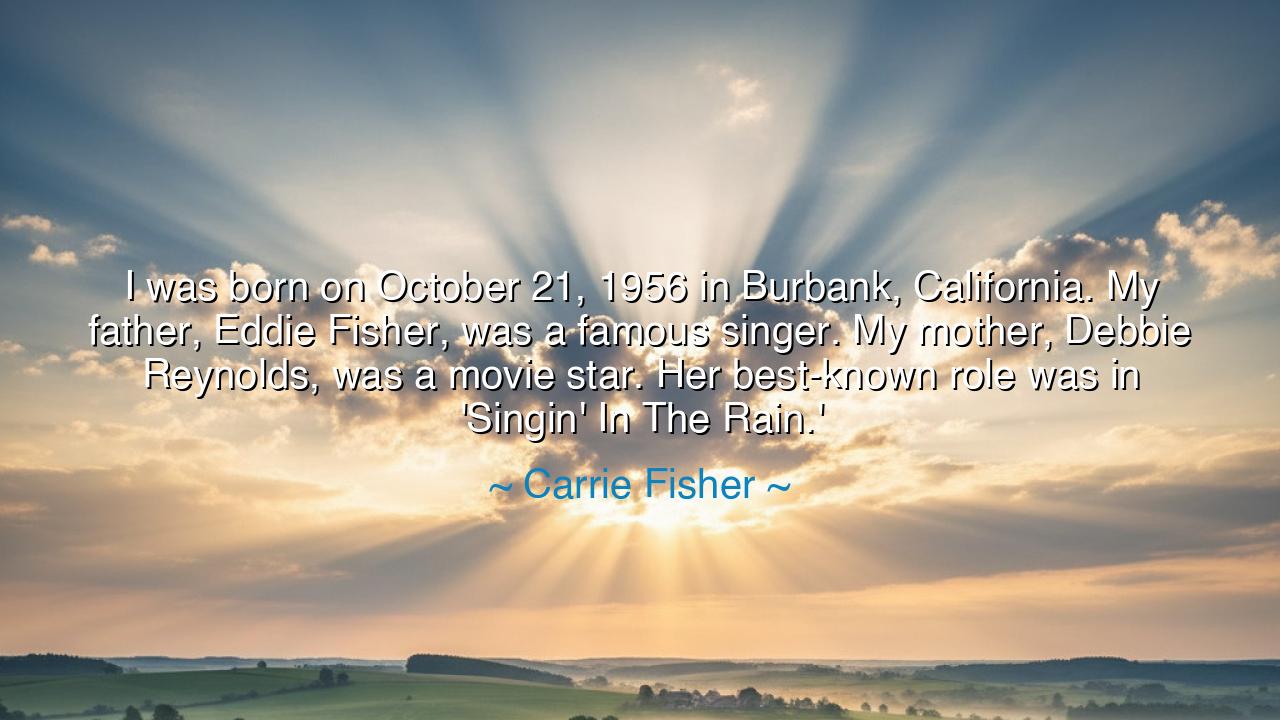
I was born on October 21, 1956 in Burbank, California. My father
I was born on October 21, 1956 in Burbank, California. My father, Eddie Fisher, was a famous singer. My mother, Debbie Reynolds, was a movie star. Her best-known role was in 'Singin' In The Rain.'






Host: The quiet of the evening settled in as Jack sat at the table, his fingers resting lightly on his cup, reflecting on Carrie Fisher’s words. Jeeny stood near the window, her gaze turned inward, considering the weight of what Fisher shared about her life and family history.
Jeeny: “I’ve been thinking about what Carrie Fisher said: ‘I was born on October 21, 1956 in Burbank, California. My father, Eddie Fisher, was a famous singer. My mother, Debbie Reynolds, was a movie star. Her best-known role was in Singin’ In The Rain.’ It’s such a personal way to introduce herself, isn’t it? She doesn’t just talk about her famous parents but names them, reminding us of the legacy and history she comes from.”
Jack: “Yes, exactly. Fisher is sharing a bit of her personal narrative, but also acknowledging the immense publicity that surrounded her family. Being the daughter of two iconic figures like Eddie Fisher and Debbie Reynolds means she’s not just Carrie Fisher—she’s part of a family legacy that has been in the public eye for years. There’s an inherent weight in that.”
Jeeny: “Right, and it’s almost like she’s recognizing that her identity was shaped by more than just herself—it was influenced by her parents’ fame, their careers, and the public’s perception of them. Being Debbie Reynolds’ daughter and Eddie Fisher’s daughter meant she was always going to be tied to those larger-than-life personas. But by naming them so matter-of-factly, she also acknowledges the reality of that experience, without being overpowered by it.”
Host: The stillness in the room deepened, as they both considered how being born into such a famous family might shape someone’s sense of identity, and how Carrie Fisher expressed this with a certain clarity and honesty. Jack’s fingers rested on the table, while Jeeny’s gaze softened, reflecting on the weight of family legacy and the way it influences public perception.
Jack: “It makes me think about how much of our identity is tied to our family, to our heritage. But for someone like Carrie Fisher, who grew up under the shadow of such public figures, the question becomes: ‘Who am I, outside of this legacy?’ Her identity wasn’t just about her own accomplishments, but also about how she navigated being part of such a famous family. It’s a balancing act, don’t you think?”
Jeeny: “Yes, absolutely. It’s not just about being seen as a person, but about carving out her own space within that history. She was Carrie Fisher in her own right—an actress, a writer, a performer—but she also had to deal with being constantly compared to her parents, constantly living in the glare of their fame. Yet, she managed to embrace it and own her place within that legacy, creating a unique voice and persona of her own.”
Jack: “That’s the interesting part, isn’t it? Fisher didn’t shy away from her parents’ fame, but she also didn’t let it define her. She found a way to merge that legacy with her own identity. It’s like she’s saying, ‘Yes, I come from this family, but I am also my own person with my own story to tell.’ That’s something many people with famous family legacies struggle with, but she did it with such authenticity and self-awareness.”
Jeeny: “Yes, and I think that’s why Carrie Fisher’s story is so compelling. She showed us how to live authentically, even when the world tries to box you into a certain identity based on your family or background. She found a way to embrace her roots without letting them limit her. She embraced her complexity, and that’s what made her so relatable and real.”
Host: The quiet in the room grew even deeper as they reflected on the ways in which identity, family legacy, and personal agency intersect. Carrie Fisher had shown them that while we can’t always control the narratives others create for us, we can still choose how to define ourselves. Jack leaned back slightly in his chair, while Jeeny’s gaze turned from the window back to him, both of them recognizing the power of authenticity in the face of external expectations.
Jack: “So, Fisher is really showing us that our heritage doesn’t have to limit us—it’s just one part of our story. Carrie Fisher didn’t let her family define her; she defined herself. She embraced her history and her parents’ fame, but she made sure that her voice was heard as well.”
Jeeny: “Exactly. And it’s a reminder that we are all shaped by our families and our legacies, but ultimately, we are the ones who get to decide who we are. Carrie Fisher found a way to honor her roots, but also forge her own path, making her story uniquely her own.”
Host: The evening had fully settled in, their conversation leaving behind a quiet understanding that while family legacies can shape who we are, they don’t define us. Carrie Fisher had shown them that authenticity comes from embracing both the past and the present, finding a way to merge those influences with our own voice and identity. The world outside had darkened, but inside, there was light—a recognition that we have the power to define ourselves, no matter where we come from.






AAdministratorAdministrator
Welcome, honored guests. Please leave a comment, we will respond soon